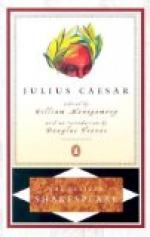|
This section contains 7,409 words (approx. 25 pages at 300 words per page) |

|
SOURCE: Parker, Barbara L. “The Whore of Babylon and Shakespeare's Julius Caesar.” Studies in English Literature 1500-1900 35 (spring 1995): 251-69.
In the following essay, Parker suggests that Julius Caesar may be read as a satire of Papal Rome, in which Caesar represents the Antichrist.
Julius Caesar is an odd mix of elements. It contains no apparent love interest and, with two exceptions, is populated wholly by men. Its monolithic maleness encompasses the minor characters as well as the major ones, from the Cobbler to the Poets to, it seems, the Romans themselves: in his oration, Antony seven times refers to his auditors as “men” or “countrymen” (women he conspicuously ignores), and Brutus neglects “shows of love” to “other men.” Despite this gender imbalance, the play contains pervasive sexual overtones. It also, as critics have noted, contains numerous religious references, including allusions to the life of Christ.1 These three seemingly...
|
This section contains 7,409 words (approx. 25 pages at 300 words per page) |

|


